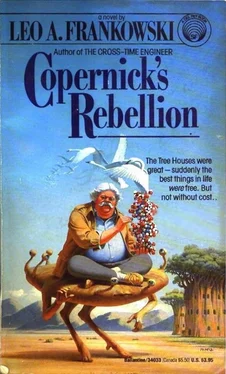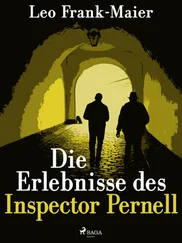“You can’t get a picture to hang straight on these curving walls. And when you cut loose the furniture to rearrange it, a new set grows back in a week. I’ve had to pay to have two sofas hauled away.” Scratchon gave a fatherly smile to the camera. “So my advice to the viewing audience is to stay with their fine, modern, man-made homes.”
“So you feel that there is nothing of value to be had from a tree house, Mr. Scratchon?”
“Well, Ms. Cambridge, I have one piece of good news. The place is showing definite signs of dying. I knew these things wouldn’t last. In a month or so, if any of your viewers need firewood, tell them to bring an ax.”
“Now let me show you what a real house is like.”
As the cameras were being moved around an in-ground pool to Scratchon’s conventional dark-brown—brick house, he said, “Ms. Cambridge?”
“Call me Patty.”
“What would you say to having dinner with me tonight, Patty?”
“I’d love to, but I can’t. I don’t know how late I’ll be up getting this show ready for tomorrow.”
“That makes you free tomorrow afternoon, doesn’t it?”
“I guess it does.” Patricia smiled.
“Can I pick you up at four?”
“Let me drop by here.” Patricia was embarrassed about her apartment.
“You’ve got a date.”
Guibedo had borrowed a television set from a neighbor especially to watch the program about his tree house. As he watched, anticipation turned through sadness into horror.
“Ach! Nails in your walls! Cutting loose your furniture! And not using your toilet! Laurel, you’re starving to death!”
Guibedo invested in a cab and arrived at Scratchon’s tree house at the same time that Patricia did.
“Dr. Guibedo! What are you doing here?”
“On your program, Scratchon he said that my Laurel here is dying, so I came right over. But he must have used the toilet, she looks pretty good now.”
“It has perked up quite a bit since yesterday, Dr. Guibedo. You really care about these trees, don’t you?”
“Sure. They’re like my children. And the Laurel series is special. We mailed out one hundred thousand of her seeds to people.”
“I heard about that—every VIP in the country got one. That was quite an advertising effort.”
“A lot of kids volunteered to help me. Friends of my nephew. We sent a Laurel to every big shot in the world! Pretty soon everybody’ll want one.”
“Dr. Guibedo, have you seen Burt? I tried to call him but his phone was out of order.”
“That figures.” Guibedo pointed to the phone wire lying on the ground. “The telephone people haven’t learned how to wire a tree house yet.”
“But still, he should have called if he wasn’t going to be here. We had a date. I’ve knocked at both houses and no one’s home.”
“Well, you check his regular house again. I’m going to look Laurel over.”
“Uh. I guess he could be sick.” Patricia went to the big Tudor brick house facing onto 169th Street.
Guibedo pulled the door branch and called inside, “Hey! Scratchon! You home?”
He walked inside. The lights were on, the furniture had regrown in its proper place, and everything was as neat as a mausoleum.
“Scratchon! It’s Guibedo!”
The kitchen cupboards were full. The bathroom was in order except that where the toilet area should have been was just smooth wood.
“So where did Laurel put the new toilet?” Guibedo muttered. “Anybody home?” He turned toward the bedroom. No one there, either.
Puzzled by the Laurel’s missing toilet, Guibedo walked slowly out of the tree house, sealing the door behind him. “No one home, Patty.”
“He wasn’t in the old house, either,” Patricia said. “And we had a dinner date.”
“So come with me. I could use maybe some schnapps.”
“Uh, okay. Why not?” Patricia followed him to the car.
Chapter Four
JUNE 12, 2000
ALL OF our realities are painted thinly on the void of our own preconceptions.
The problem of training intelligent engineered life forms is a case in point. I designed them with almost no internal motivational structure, except for a certain dog-like desire to please.
I made the major error of assuming that tabula rasa meant the same as carte blanche. It never occurred to me to explain to them things that I assumed were “intuitively obvious.” Things like kindness and decency and respect for life.
—Heinrich Copernick From his log tape, on finding the tombstones of eighty-five families
Major General George Hastings, Commander, Air Force Intelligence, sat in his office in the Pentagon. He hadn’t slept in thirty hours. His face was haggard.
His wife and children had been missing for two days. They had gone off to spend a week in their new tree house at Lake George and had vanished.
Hastings had TDYed one of his best security teams to Lake George and now the report was back.
Nothing.
The car was parked, no unusual fingerprints on it. The soft path to the house showed only the footprints of Margaret and Jimmy and Beth. There was no ransom note. Nothing. They had vanished from the world just as Scratchon had.
Scratchon? Scratchon and Margaret both had tree houses!
Hastings hit the button on his intercom. “Pendelton!”
“Yes, sir,” a sleepy, obedient voice replied.
“Get Research out of bed.”
“The whole staff, sir?”
“Hell, yes! They are to determine the correlation between currently missing persons and Laurel series tree houses.”
Tree houses at four o’clock on a Sunday morning! “Yes, sir. Full Research staff, tree houses and missing persons.”
Nine hours and half a bottle of amphetamines later the answer came in. Correlation—32 percent.
Thirty-two percent of the people in the sample who owned Laurels were either officially missing or could not be contacted.
Hastings was making up a list of military and governmental officials to be informed of the correlation when Pendelton knocked and entered.
“Thought you should see this, sir.”
It was a day-old National Enquirer. On the front page was a color photograph of a desiccated female corpse half absorbed by a tree-house bed. From a delicate web of roots, a wedding band gleamed.
It was out of his hands now; Hastings went to his empty apartment to sleep and to cry.
A week later Hastings was back at his desk. He felt neither grief nor anger. Only a deadly emptiness that would never leave him.
A knock at the door was immediately followed by Sergeant Pendelton. “They got him, sir.”
“Got who?”
“Martin Guibedo, sir. The Michigan State Police picked him up north of Kalamazoo.”
“It took them long enough.”
“These people with tree houses rarely need to use credit cards, sir. It makes them hard to find. Here’s the report on tree-house occupation, sir.”
“Give it to me verbally.”
“Yes, sir. Basically, people have abandoned the Laurel series houses. But three other species are in common use, and the people in them generally intend to continue using them.”
“Idiots.”
“Yes, sir. The consensus is that it was a technical malfunction in a single product line, and that it does not cast discredit on the entire concept of bioengineering. It’s rather like the public reaction to the Hindenburg disaster seventy years ago, when people ceased using airships but continued to use airplanes.”
“Huh. Anything else?”
“Yes sir. Section Six requests that you visit them.”
“What is it, Ben?” Hastings said.
“We’re out of business, George. Nobody but Mike can pick up anything but a loud roar. It gives you a headache.”
Читать дальше











